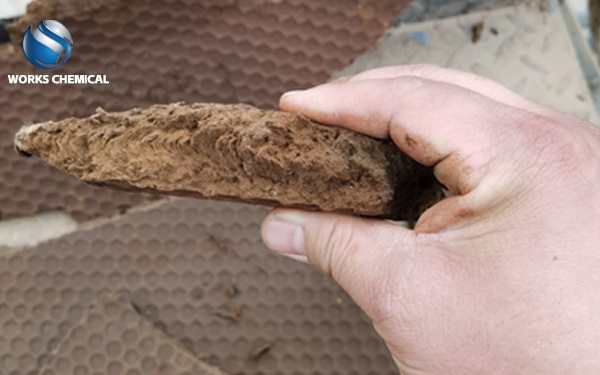
For the case of high sludge moisture content, in order to achieve the effect of sludge deep dehydration, the following agents can be considered, and combined with relevant figures and information to explain:

Polymer flocculant:
Type: such as cationic polyacrylamide (CPAM), etc.
Features: It has a higher charge density and a longer molecular chain, which can be more effectively adsorbed on the surface of the sludge particles to form a large and tight floc.
Effect: It is helpful to achieve better dehydration effect through press filtration and other ways, so that the sludge moisture content reaches the standard of deep dehydration (55%~65%).
Compound conditioner:
Features: Qingdao Shijun independently developed a new compound conditioner (sludge synergist) for deep dehydration, which may contain inorganic compounds, sludge surface structure modifier, wall breaking agent and other components.
Function: It can not only change the surface properties of the sludge particles, but also destroy the cell wall and release the internal water, making it easier to remove the water when the sludge is mechanically squeezed.
Expected effect: It can effectively reduce the moisture content of sludge, improve the dehydration efficiency, and achieve the effect of deep dehydration.
Biological enzyme preparations:
Application scenario: In specific cases, such as when the sludge contains a large amount of organic matter, the biological enzyme preparation can be used as an auxiliary conditioner.
Mechanism of action: Promote the release of water in sludge by decomposing organic matter, thereby improving the dehydration performance.
Note: The effect of biological enzyme preparations may be affected by many factors such as sludge properties and operating conditions, and it is necessary to select and use according to the actual situation.
New dehydration technology with pharmaceutical:
Application scenario: Combined with new dehydration technologies such as hot drying, ultra-high pressure pressing and hot mechanical dehydration.
Features: These special agents are often specially formulated to meet the dehydration needs under specific process conditions.
Effect: It can improve the dehydration efficiency, reduce the moisture content of sludge, and achieve the goal of deep dehydration.
When using the above agents, the following points need to be noted:
The selection of chemical agents should be considered according to the properties of sludge, treatment objectives and economic conditions.
Dosage, method and time of dosage need to be strictly controlled in order to give full play to its effect.
Before using the agent, it is recommended to conduct laboratory and field pilot tests to verify the effect and economic feasibility of the agent.
In order to achieve the best dehydration effect and reduce the cost, the dosage of the agent, the dosing method and the coordination with other treatment steps need to be optimized.
In summary, through reasonable selection and use of the above agents, combined with appropriate operating conditions and equipment configuration, the moisture content of the sludge can be effectively reduced to achieve the effect of deep dehydration of the sludge.